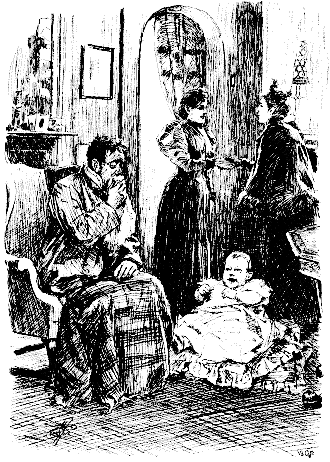
THE COMPENSATING CIRCUMSTANCES.
Sympathetic Visitor. "Poor dear Mr. Smith, how he must suffer with all that Sneezing and Coughing."
Mrs. Smith. "He does, indeed; but you can't think how it amuses the Baby!"

Sympathetic Visitor. "Poor dear Mr. Smith, how he must suffer with all that Sneezing and Coughing."
Mrs. Smith. "He does, indeed; but you can't think how it amuses the Baby!"
(A Dramatic Forecast of the Farce of the Future.)
Scene—Smoking-room of the Toy Club. Reformed members sipping lemon-squashes and inhaling tea-leaf cigarettes and reading "The Happy Hearth" and periodicals of a similar character.
First Member. I am heartily glad that the committee decided to change the name of the club from the Handicap to the Toy, as it has brought an influx of such extremely eligible members. The bishop is perfectly charming.
Second Member. Quite so, and really the archdeacon's stories are first rate. I suppose you heard his anecdote about the pew-opener who thought that matins were a substitute for oil-cloth?
First Mem. Excellent, it was told me yesterday by the Lord Chancellor of British Undiscoveredland. And how much better it is that we are not allowed to bet in the old-fashioned way. When you come to think of it, there was something amazingly demoralising in permitting a Guinea Club Sweep for the Derby.
Second Mem. I should think so! I give you my word that I put my name down in every single sweep in the old Handicap for fifteen years, and never once drew a starter.
First Mem. My experience too. Have you heard whether there is to be any substitute for the sweep this year?
Second Mem. Why, yes. I was told by a member of the Recreation Committee that all members taking the bread-and-milk luncheon daily for a week are to have chances for the Grand Derby Race Christmas Tree.
First Mem. Isn't a Christmas Tree a little too late or too previous in June?
Second Mem. Well, yes; but then it was said that once the Derby was run in a snow-storm, and so we might take it that sometimes we have winter in summer.
First Mem. I see. Have you any idea what the prizes are to be?
Second Mem. Oh, some of them will be very handsome. I am told that the tree is to be decorated with tea-cozies and silver-mounted blue spectacles.
First Mem. Really! I shall not forget to take my one o'clock bread-and-milk regularly in the coffee-room for the next week. I suppose you have quite given up your betting-book?
Second Mem. Well, no, because you see the Act permits betting in moderation, and under proper restrictions. For instance, I am quite prepared to take seven to one against Snuffbox for the Hardbake Selling Stakes, only of course it must be in peppermint drops.
First Mem. (producing betting-book). Well, I would accommodate you if I were not overburdened with peppermint-drops. Make it brandy-balls, and I will do it in ounces.
Second Mem. (referring to betting-book). I am not particularly fond of that sweetstuff, but I think I can act as commissioner for my aunt. (Enters bet.) Is your list full for The Band of Joy Two-year-old Caudle Cup?
First Mem. (after reference to betting-book). Well, I don't mind backing my opinion about the Churchwarden's County Council. Do you know his price?
Second Mem. I see in the Charity Box of last night that he was in considerable demand at Tattersall's. As much as two to one in Abyssinian sugar-sticks was taken freely. I don't mind letting you have a pound of mixed biscuits to an ounce of Everton toffy, if that will suit you.
First Mem. All right. (Makes entry in betting-book.) And now I really must go.
First Mem. What, are you off?
Second Mem. Why, yes. I want to see my stockbroker. I have quite a heavy flutter on in connection with these new Carbonate of Soda Mines. If they don't go up a bit before the next account I may lose a cool thousand.
First Mem. Just my case. However, I shall be able to pull through, as now that gambling is prohibited on the turf and in the club, there is more money available for different purposes.
[Exeunt for the City.
The jocund spring, in season ripe,
Her reign of gladness hath commenced,
Each shepherd mends his broken pipe,
Each nymph knows well
The subtle spell
By which she'll soon be influenz'ed.
Then tarry not, belovèd maid,
Nor make thy worshipper endure
Such woes as haunt him who's afraid,
And yet desires
To think Love's fires
Alone have raised his temperature!
What though the crocus still delays?
No fragrance hath it sweet or rare;
The snowdrop pale let others praise;
We need not yet
The violet
When eucalyptus fills the air!
Away with winter's peevish woes!
We'll wander though the meadows green
Or where the babbling river flows,
And on the brink
We'll sit and drink
Ambrosial tincture of quinine.
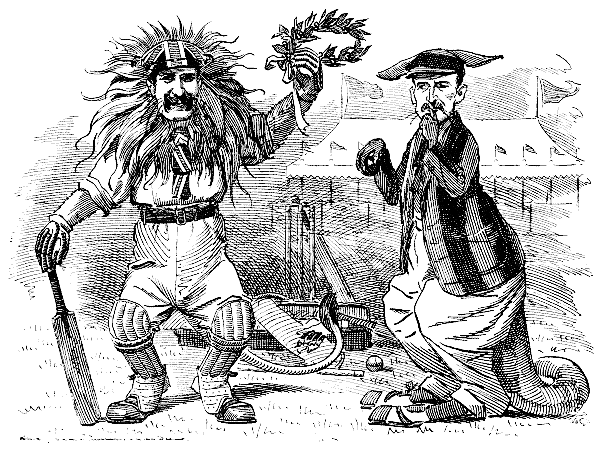
Mr. St-dd-rt, Captain of the English Eleven, with Mr. G-ff-n, the Australian Captain, sing in harmony—
"The Lion and the Kangaroo
Fighting for the Crown,
The Lion beat the Kangaroo—
Helped by Mr. Brown!"
*** "Mr. Brown was 'caught' with 140 to his credit."—Times' Report.
Or, The Battle of the Bats.
The Lion and the Kangaroo
Fighting for the Crown,
The Lion licked the Kangaroo—
Helped by Mister Brown!
Air—"Battle of the Baltic."
Of Stoddart—splendid name!—
Sing the rapturous renown,
When our boys to battle came,
All to win the Cricket Crown;
Though Australia once again the toss had won.
But the Britons took their stand
In a bold determined band,
And the Best Bat in the Land
Led them on.
Like "Leviathan" in form,
Little Gregory laid on,
Doughty Darling made it warm,
And George Giffen, fadeless one,
Smote our trundlers with a coolness quite sublime.
Four—One—Four! The "wire" so saith!—
There was silence deep as death,
And our boldest held his breath
For a time.
But the hopes of England flushed
On that mighty Melbourne green;
How young Ward and Stoddart rushed
O'er the space those stumps between!
Sixty-eight our Captain piled, and the fun
Cool Maclaren kept alive;
With Six-Score! Bob Peel did strive,
And our score was Three—Eight—Five!
Ere 'twas done!
Australia once again!
And the scoring does not slack.
May kind heaven avert the rain,
Till the last bat hies him back!
At good shots how the cheers break and boom
Round the ring!—and oh! the wail
At the click of flying bail,
As the Richardsonian hail
Pelts—like doom!
Good Grey George, the Australian Chief,
Smote again his swashing blows.
Mingled sounds of joy and grief
From the Melbourne ring arose!
When the stumps again are drawn for the day
Brockwell, prey to bad luck's blight,
Is again out of the fight,
Ward and Stoddart in, to smite
As they may.
Two—six—nine more runs to make!
And one leading wicket down!—
Old World, let thine echoes wake
With the honoured name of Brown,
Yorkshire Brown, the last selected, but not least,
Oh! to see him smite and run,
With Lancashire's great gun,
Albert Ward, to share the fun
Was a feast!
One-forty! Ninety-three!
Though, for once, stout Stoddart failed,
That left few more runs, d'ye see?
And though Trott and Giffen hailed
At the stumps, and Jarvis watched like a cat,
Young Maclaren and Bob Peel
Won the match slap off the reel,
By six wickets! How d'ye feel
John, at that?
Out spake the victor then
(And we echo him o'er the wave),
"Ye are brothers, trumps, and men!
And it was the narrowest shave
That victory to us Britons did allot.
That Crown, as is but meet,
We will lay at England's feet.
But by George, you're bad to beat—
George's Lot!"
Now joy, Old England raise
For the tidings of that fight.
Gallant Stoddart crown with bays!
When the wine-cup brims to-night
His name will sound the loudest midst the roar.
Thanks to him, and Mister Brown,
And some others of renown,
We still keep the Cricket Crown
On our shore.
But though Lion-Stoddart wears
That proud wreath, the Kangaroo
("Old Man" Giffen) fairly shares,
With his good and gallant crew,
The best honours of the game they fought to save.
At the wickets far from flats,
In the field they were like cats.
So here's power to the Bats
Of the Brave.
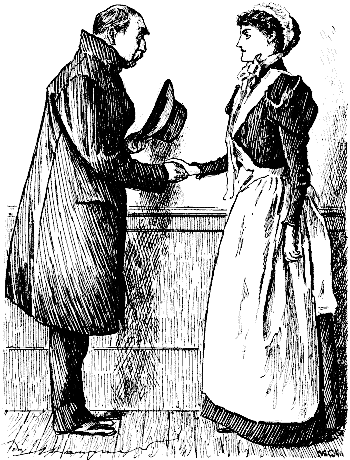
Patient (cured, and leaving the hospital—to Nurse). "I thank you kindly, Miss, for all your goodness—I shall never forget it! If ever there was a Fallen Hangel you're one!"
(Died at Edinburgh, Saturday, March 2, 1895, in his 86th year.)
Thou brave old Scot! And art thou gone?
How much of light with thee's departed!
Philosopher—yet full of fun,
Great humorist—yet human-hearted;
A Caledonian—yet not dour,
A scholar—yet not dry-as-dusty;
A pietest—yet never sour!
O, stout and tender, true and trusty
Octogenarian optimist,
The world for thee seemed aye more sunny.
We loved thee better for each twist
Which streaked a soul as sweet as honey.
We shall not see thy like again!
We've fallen on times most queer and quacky,
And oft shall miss the healthy brain
And manly heart of brave old Blackie!
Mrs. R. says she wouldn't miss the Naval and Military at Sandown for anything.
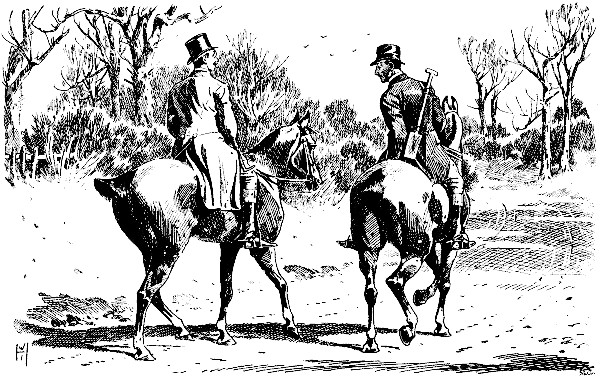
(For surmounting the Snow-drifts whenever they may be, as they have been till quite recently, heaped up behind most of the Fences.)
Sportsman (with Spade). "Wouldn't be without it for the world, Old Chap! Had to dig myself out no less than Three Times to-day!"
(Before Mr. Justice Reason.)
His Lordship asked whether Brown v. Jones was ready?
Mr. Bands. No, my Lord. I am requested by my learned friend, Mr. Wigge (who is in the Strand), to say that unfortunately——
His Lordship (interrupting). Oh, very well! if the parties do not take sufficient interest in the matter to appear here at the proper time, I shall assume that the whole affair is frivolous, and strike it out. Next case please.
A Mr. Smith rose in the body of the Court and said that he appeared in person.
His Lordship. Is the defendant here?
Mr. Bands. I appear for the defendant, my Lord, Mr. Snooks. Allow me to say that——
His Lordship (interrupting). No, no, Mr. Bands; your turn will come by-and-by. I will hear what the plaintiff has to say first. Now you, Sir—I mean Mr. Smith—what is it all about?
The plaintiff then entered into a lengthy narrative of certain negotiations about the purchase of a house.
His Lordship (interrupting). Do you want to buy the place, now?
Mr. Smith. No, my Lord, at least——
His Lordship. You said no, and I suppose you meant what you said. And now, Mr. Bands, does you client want to sell the house?
Mr. Bands (promptly). Certainly not, my Lord; but perhaps you will allow me to explain.
His Lordship. Explanation absolutely unnecessary. No order, and Mr. Snooks, as he has gone to the expense of instructing (to my mind absolutely unnecessarily) counsel, will have the pleasure of paying for the luxury. Next case.
In this instance both the litigants appeared in person. The question in dispute was a right-of-way.
His Lordship. Now, gentlemen, although you have elected to appear before me without any intermediary, I am bound to tell you that if the matter is carried further—to superior courts—you will find yourselves both landed in heavy costs. What do you say, Mr. Johnson?
Mr. Johnson (one of the litigants). Well, of course, my Lord, I don't want that; but if I win my cause, why Mr. Thompson will have to pay for us both.
His Lordship. Come, come; I see there is a good deal of personal feeling in this matter. Take my advice and settle it amicably. I do not sit on this bench to encourage gambling, but if either of you has in his possession, what I believe was called by Mr. Box in the case of Box versus Cox, a "tossing" sixpence, you might come to an understanding in five minutes. I will wait until you have conferred with one another.
The litigants upon this invitation held a consultation.
Mr. Johnson. It is all right, my Lord. I called heads, and——
His Lordship (interrupting). I don't want to hear anything about that so long as Box and Cox—I should say, Johnson and Thompson—are satisfied, the rest is immaterial. And now, is there any further business before me?
His Lordship was informed that there were ten causes to be heard, and that all the parties were in attendance.
His Lordship. Am I to understand that not only counsel but their clients are present.
Mr. Bands (after consultation). Certainly, my Lord.
His Lordship. Then allow me to address them en bloc. Now I am quite sure that a few minutes' conversation amongst yourselves will set everything right. Commence with the very sensible assumption that anything is better than litigation, and see what comes of it. I will retire to my room to let you have a chat in comfort. When you are all ready, send for me. But mind, take my advice, and hold to the sensible assumption that anything is better than litigation.
His Lordship then retired, and the parties interested acted upon his suggestion. After a quarter of an hour's conference the Judge was summoned into Court.
His Lordship. Well, and what is the decision?
Mr. Bands (in a melancholy tone). May it please your Lordship all the cases have been settled out of court.
His Lordship. So much the better. And now as I have cleared off my entire list, I bid you an affectionate farewell.
The Court was then adjourned sine die.
Shakspeare's Advice after the L. C. C. Election.—"Furnish out a Moderate Table."—Timon of Athens, Act III., Scene 4.
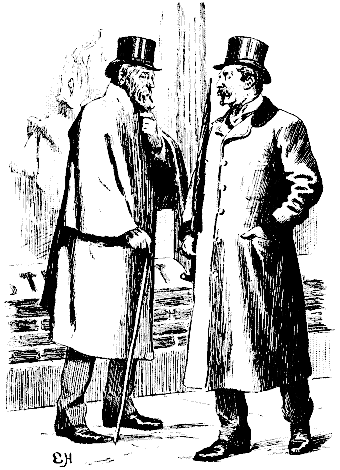
First Friend (sympathetically). "Going strong, Old Chap?"
Second Friend (preoccupied with recent elections). "Moderate. And you?"
First Friend. "Um—progressing."
Second Friend (with only one idea). "Progressive! Then we shall fight in the L. C. C."
First Friend. "L. C. C.! No, no! I meant the Influenza!"
(By Mr. Punch's own Short Story-teller.)
I.—THE PINK HIPPOPOTAMUS. (CONCLUDED.)
A dim mysterious light was burning in the stall of the sacred animal. By its rays I was able to see not only the hippopotamus itself, but also the gaping hole in the skylight through which Ganderdown and I had been thus fortuitously projected into its manger. The walls I noticed were thickly panelled with gold slabs, on which were chased mystic emblems connected with the cult of the gigantic beast. Here and there a glittering point caught the light and gave it forth again in a thousand fantastic iridescent rays. One of these was above my head, and as I gazed at it I realised that it was a huge ruby of the first water. In the manger itself were lying shivered fragments of the skylight. I picked one of these up with all possible circumspection. It was a magnificent piece of the very finest diamond. Without another word I crammed all I could lay my hands upon into my pockets and those of Ganderdown. Then I paused to reflect.
The situation was not an easy one. We had arrived, indeed, at our goal; but how should we contrive to get away with our booty? No doubt we could manage to elude the vigilance of the guards if we returned alone. But this was not to be thought of. Either we would take the hippopotamus with us or perish where we lay. I communicated my resolve to my companion, and, as I expected, obtained his emphatic approval. What then was to be done?
All this time, I should state, the huge object of our adventure was calmly munching his evening meal of soaked rice within three inches of the place where Ganderdown and I lay huddled up together. I saw his immense jaws rise and fall with the regularity of some enormous machine, and I was able to look right down into the cavernous recesses of his being. His eyes twinkled occasionally with a sidelong look at us, but he seemed calm and undisturbed, as though he felt that we could not escape him, and that when he had done with his rice there was a double bonne bouche waiting for him in the corner of his manger.
At this moment the shrill voice of a Muezzin sounded weirdly through the stillness of the summer night. Three times he called?, and then once again all was still. A minute or so afterwards I heard a dull tramp, as of a regiment, coming towards the place in which we were sheltered. What could it mean? I took out my watch. The hour was fifteen minutes after midnight. And then, by a sudden effort of memory, I remembered that the dear old Meebhoy had told me that at this hour every night a crowd of fanatical priests and attendants, armed every one of them to the very teeth, came to the stable of their sacred brute in order to take him out for an hour's promenade through the groves and avenues that surround his shrine. The danger, then, was imminent. If we were discovered nothing could save us, and we should perish miserably with our prize within our grasp. My mind was instantly made up.
"Ganderdown," I whispered; "have you ever been inside a hippopotamus?"
"Never; but I was once told by a dirty little urchin to get inside a horse—why, I know not, as the attempt for a man of my size——"
"Enough of that, Ganderdown; you have got somehow or other to get inside this hippopotamus."
"All right," said the major, who, as I have said, never displayed the least trace of emotion; "all right. I suppose I had better take my boots off," and, suiting the action to the words, he did so.
"Stay," I murmured; "have you a long leather thong?"
"Here is one," he replied, producing it; "I never travel without one. You never know what may come in useful."
I took it from him and bade him prepare for the plunge. Nearer and nearer sounded the tramp of the advancing priests. I judged that we had exactly three minutes left, and I told Ganderdown that the next time the animal's jaws were open to their widest he was to go down head first, and trust to providence and me for the rest. Ganderdown needed no further incitement. Kissing a locket containing a specimen of his wife's hair he extended his arms above his head in correct diving attitude, and, as the gigantic mouth opened slowly, sprang forward and in a moment disappeared within this living vault. As he did so, I passed a loop of the leather thong firmly over the beast's lower jaw, fitting it in where there are gaps in the teeth. As I anticipated, he did not notice this, being entirely taken up with the surprise of receiving his human cargo. I then took the ends of the thong in my hands, and, as the step of the leading priest sounded at the door, I, too, leaped into the cavity in which Ganderdown had so bravely preceded me.
There are some things in my life that I do not care to dwell upon. Description, however vividly it may serve to paint the dauntless courage that has ever borne me safe through dangers, can only give me pain by recalling to me the horrors and the terrors through which I had to pass. The inside of the Pink Hippopotamus was one of these awful situations. Let it suffice to say that I found Ganderdown alive, but stertorous, and that I was able to relieve him by undoing his shirt-collar. I had my compass, I had a pair of excellent reins. Why say more? To this day the Ghazis and Mollahs, and the tribe of Hippo-worshippers who are still to be found inhabiting the rocky mountain fastnesses of Jam Tirnova, have been unable to realise why the beast they prayed to should have suddenly taken it into his head, some forty years ago, to make straight for the Diamond City instead of returning, as was his wont, to his gilded stall. But so it was.
When we arrived at my headquarters, after I know not how many days, and emerged from our close confinement it was early in the morning. But my father and the Meebhoy were ready to welcome us.
"Sorra one av ye," said the fine old Meebhoy, "did I ever expect to see in this vale of sorrow, where the schemes of the wicked are like a butter-slide in a pantomime. But I guess you've put the thing through, my son and there's nane ither of a' that come ben the hoose that could have played Billy the Baker's Boy with the Ranee's Pink Hippo."
The Ranee was of course deposed, and the Meebhoy was installed in her place. He offered me the command of his army and a salary of two hundred laks a year. But I had had enough of the country, and soon afterwards left for England, taking the sacred animal with me. Unfortunately, however, it died at sea of home-sickness, and had to be consigned to the deep in latitude 25°1, longitude 42°3, I had grown quite attached to the poor beast, and it used to follow me about like a dog, making all kinds of funny noises to express its affection for me, and eating out of my hand with remarkable tameness. Its loss was a great blow to me.
[THE END.]
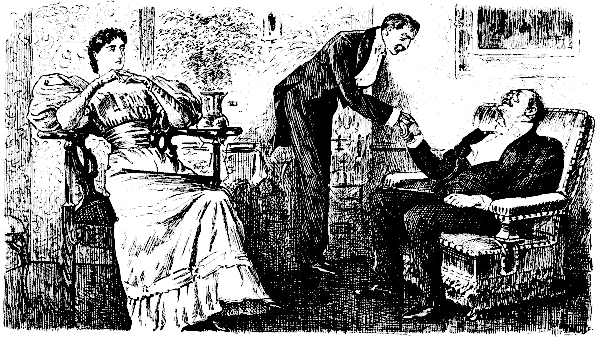
Husband and Host (waking up from postprandial snooze). "What—going? Oh, I'm afraid you must have found it very dull. I've got a dreadful habit of Napping after Dinner!"
Guest. "Dull, my dear Fellow? It's never dull here when you're Asleep!"
["He (the late Ismail Pasha) did not conceal his opinion that Egypt should be left to the Egyptians, but admitted that a strong Government was indispensable. He thought that in any circumstances a great deal would depend upon the character of the Khedive. Ismail believed that if the Khedive were a competent and energetic ruler, a satisfactory state of affairs might be established in Egypt within a very short time."—"Times" Vienna Correspondent.]
Could Pentaour, the Copt poet-laureate, scribe, bard and friend of the King,
Sing now, as aforetime to Rameses, how, and of what should he sing?
Of Nile given up to the Giaour, its increase made o'er to the Jew
Modern Pharaoh would gladly let go with his bonds and his power of screw?
Of Ra superseded by Apis, of Rameses bluffed by John Bull,
Of the pride of the pashas o'erthrown, of the cup of the fellaheen full?
Should he sing of the anger of Abbas, the fretful and furious boy,
Who with tantrums, and toys, and intrigues, would the counsels of Cromer destroy?
Nay, for he sang of heroes and men, of the might of victorious gods,
And not of a petulant child with the charge of his champions at odds,
Or of journalists juggling with words, or financiers jobbing with bonds.
Young Abbas fares forth to the Sphinx, to the secular Sphinx, that responds
To none save the fate-ordered questioner. Look at that stony set face,
Which the passing of many an empire, the waning of many a race
Hath seen in its stare o'er the sand-wastes! It Pentaour beheld in its pride;
And now the boy Abbas, in eager-eyed question, creeps close to the side
Of the age-battered Oracle! Hist! All the desert is still as the sky.
Do the voices of forty fled centuries sound on the breeze that breathes by?
Bear they meanings the Frank would acclaim, or the latter-day Hebrew approve?
Those Voices are hard to interpret, that Sphinx is not easy to move.
It would speak with the music of Memnon, in Abbas's ears, did it say
The Frank shall return whence he came, and the Briton betake him away.
Yet Ismail the shrewd, the unscrupulous, knew what young Abbas must learn,
That a Government strong to subsist, which no blast of intrigue can o'erturn,
Is not shapen of shifting Nile sands, broken reeds, which, like Egypt of old,
But pierce through the hand that shall rest on them. Abbas the boy may be bold,
With a thoughtless boy-boldness, but is he the Khedive keen Ismail foresaw,
Of character 'stablished on justice, of force firmly founded on law?
Poor boy, eager-eyed, half exultant, he lifts, half inquiry half plaint,
His Voice of Appeal to the Sphinx. On the air of the desert how faint
Sound his words, "Is it Egypt, O Sphinx, for Egyptians?" There comes no reply,
But straight o'er the sands, as of old, staring forth to the weird desert sky,
Unmoved, unresponsive, indifferent, gazes that stony face still,
Incarnation of calm most colossal, cold patience, immovable will,
Looking far beyond time, far above human hope, mere midge-fret of the day,
Into—what? There's no mortal who knows, and the Sphinx, if it know, doth not say.
'Tis silent—with silence that means not consent to the youth's wild appeal;
Still, still the set face which is stone gazes forth on a sky which is steel!
First Man (impressively). I was in bed for a week.
Second Man (indifferently). I was in bed for a fortnight.
First Man (boastfully). Ah, but I had most severe pains in my back and head.
Second Man (contemptuously). Very likely. I had most severe pains all over me.
First Man (exultingly). Well, anyhow, my temperature was 103½°.
Second Man (crushingly). Oh, that's nothing! Mine was 107°.
[Exit in opposite directions.
The "Happy Despatch" for the Swazies.—The Convention of 1894, just signed, between Sir H. Loch and President (D)"oom" Kruger.
A Correspondent, who has been reading Gray's "Elegy," says there is a reference to the England v. Australia match in it. He quotes the line—
"How jocund did they drive their team afield!"
as proving his point. The allusion to "drives," "teams," and "fielding," he remarks, can hardly be misunderstood. And if they could, the following line settles the matter:—
"How bow'd the wood beneath their sturdy stroke!"
Didn't the wood bow and bend when Brown was in, he asks? Wasn't Ward's on-drive for five a sturdy stroke? We must refer him to Mr. Stoddart for a reply.
Psalter and Salta.—Aided by the careful arrangement of "contents" (and with regard to "Mr. G.'s" latest publication there are no "non-contents") the reader can easily find any passage in this "Psalter." At this moment there is another "Salta" to which the attention of not a few is directed, and the non-contents or anti-Jabezites know that it is very difficult to get at him, or to find a passage out of that Salta for J. B.
If ever there were a clergyman's name, and title, suggestive of the Militantest of the Church Militant, it is "Canon Gore."
The Baron is not aware whether the volume before him, Japhet in Search of a Father, is the first of Captain Marryat's works re-issued by Macmillan; but the Baron, speaking on behalf of Mr. Punch, is indeed delighted to welcome a very old friend, and hopes to see many more of Captain Marryat's able and amusing crew. "If the gallant Captain, R.N., with his true British sailors, cannot command a sale, who can?" asks the Baron, and pauses not for a reply. It is to be hoped that Midshipman Easy is still on board. The Baron anticipates great pleasure from renewing the acquaintance of that gay sea puppy. Quite a Happy Thought,—"Why not republish Marryat? We will." So all hands to the re-issue, and success to it, quoth the nautical
Good Omen.—One of the Directors of a New Water Company is Sir Spencer Wells. Everyone well knows the genuine value of the Sparkling Wells. Will the worthy Bart., as the Mädchens do at the Elisa Fountain, serve out "the Harefield" (not Hare-aërated) "and Springwell" waters at a much-frequented bar, and be thenceforth known as Sir Dis-pensary Wells? We wish them all success. "Water, water, everywhere, and plenty fit to drink!"
["Some time ago Her Majesty inquired after Mrs. Keeley, and was informed that she was well and in her ninetieth year. The Queen expressed a wish to see her, and Colonel Collins arranged for Mrs. Keeley to have the honour of being received at Buckingham Palace yesterday afternoon, when she was presented to Her Majesty. The welcome given to the gifted lady, who so wonderfully preserves her health, intelligence, and vivacity, was most graceful and cordial; and the Queen was pleased to recall to mind several interesting incidents of the past."—Daily Telegraph, Thursday, March 7.]
Oh, when I was a little Eton boy,
With a heigho! I need not explain,
"The Keeleys" were a wondrous joy,
For they were so droll in every play.
But now I am at mid estate,
With a heigho! I need not explain,
Here's Mrs. Keeley tête-à-tête
With our Gracious Queen Vic-to-ri-a.
No Betsy Baker ere like you!
With a smile, smirk, I need not explain!
That rascal, gay Jack Sheppard, too,
With a "Nix, my dolly! fake away!"
I've seen you dance and heard you sing
With a sly eye, I need not explain,
How well you acted everything
In whatever part you chose to play!
That you're about and well we know,
With a Hooray! a cheer once again!
And may you long continue so,
Till the curtain falls and ends the play.
"Heard in Court."
Counsel. Now tell me, while you were standing as you say just in front of the defendant, did anything remarkable strike you?
Pat. It did, Sorr.
Counsel. And what was that?
Pat. His fist.
I.
Who is Silver?—what is she,
That all our swells commend her?
Very tough and bright is she;—
The heavens such grace did lend her,
That adopted she might be—
That adopted she might be!
II.
Is she constant as she's fair?
Or is she light and heady?
Gold might to her arms repair
To help him to keep steady;
And, being helped, inhabit there—
And, being helped, inhabit there.
III.
Then, if Silver plays mad tricks,
Or Gold is always changing,
So that none their price can fix,
From par to premium ranging—
Let us both together mix!—
Let us both together mix!
Fitting Finish.—The Portuguese financial agent wrote last week to the Times to contradict the report as to a "further issue" by his Government of "tobacco bonds." So this ends in smoke.
A Blue "Tip" for the University Race.—With Game rowing and Hope in the bow, the Cambridge Eight this year ought to make a close race of it.
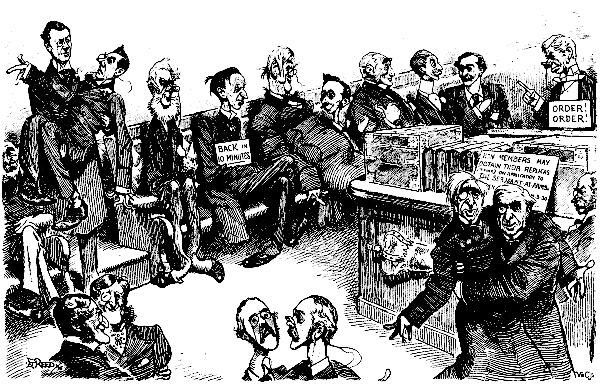
A SOLUTION OF THE HAT DIFFICULTY.
Why not keep on the Premises portable Replicas of all Members, carefully modelled in wax, with appropriately padded Figures, which can occupy their places during any temporary absence. When in situ the difference is scarcely perceptible.
EXTRACTED FROM THE DIARY OF TOBY, M.P.
House of Commons, Monday, March 4.—Prince Arthur still away, dallying with influenza. Recent experience of carefully considered, but not altogether successful effort at leadership by other wing of allied army doesn't make Opposition irrepressibly anxious for more. At least, not just at present. Jokim shunted off the main line; Hicks-Beach takes charge of train in temporary absence of regular guard. To-night Ireland coyly comes again to front; John Morley brings in still another Land Bill. In such circumstances Prince Arthur's absence, always regrettable, becomes peculiarly unfortunate. He knows Ireland thoroughly, and where knowledge fails he supplies the lack with inflexible opinion; which, in an Irish Minister or Ex-Minister, is the next best thing to knowledge.
Happily there is Carson and St. John Brodrick. They represented Front Opposition Bench in Committee on Land Question which sat last year. At one crisis, things not going in Committee exactly as they desired to conduct them, they haughtily rose and left the room. A striking scene, never to be effaced from memory of those who witnessed it. It was, or should have been, like withdrawal of props that sustain mighty masonry. The temple should forthwith have toppled, burying in its ruin the ten or twelve Members who had differed from middle-aged youth. Nothing happened except the Committee went on with its work just as if it were still sustained by presence and counsel of the retiring two. Report was completed in sense of majority, and here was presented to House a Bill founded on its recommendations.
To-night the two props of the Constitution resumed their useful service of sustentation. Carson, as he mentally struggled with the problem of governing Ireland, unconsciously fell into Prince Arthur's early but now abandoned trick of sitting with his feet on the table. Near him, diligently making notes whilst John Morley expounded his Bill, sat St. John Brodrick. "There," said Carson who has not forgotten his Pope—
"There St. John mingles with my friendly bowl
The feast of reason and the flow of soul."
The brew thus blended did not prove very exhilarating. Word passed round Opposition benches Land Bill not to be ruthlessly opposed at this stage. With Boanerges Russell approving it on behalf of Ulster farmers, won't do for Unionists to show themselves implacable. So the friendly bowl turns out to be something of the texture of a cup of tea, lukewarm and oversweetened withal. More sad even than compulsory meekness of two statesmen on front bench is depression of Saunderson. The Colonel must needs ramp in on such a question, but is pledged to fight with button on his foil. After this unwonted spectacle House could stand no more; gratefully gave leave to bring in Bill.
Business done.—Irish Land Bill brought in.
Tuesday.—Quite like old times to-night. The hum of the B's is heard once more in the land, albeit the thermometer registers ten degrees of frost, and every other Cabinet Minister is down with influenza. It is true Byrne and Butcher have not yet put in appearance; but Bartley is here and Tommy B., and Private Hanbury, who is perhaps more of a wasp than a bee. It is the sunshine of Committee of Supply that has brought them out. Came to the front in discussion round money voted for improvements in arrangements of House of Commons completed in recess. These were undertaken by direction of Select Committee, which thoroughly went into matter. Herbert Gladstone, who has taken to delicate duties of First Commissioner as if he had been born in one of the Parks, devoted much time and personal attention to seeing improvements carried out. Members coming back to labours of new Session found House swept and garnished. New dining-room and large smoking-room; baths and wash-houses, where Parliamentary dirty linen may be renovated.
Herbert too modest to anticipate vote of thanks for his labours, though almost any other man would in circumstances look for such recognition. Still, if something of that sort had been incidentally done, no one would have been much surprised. So far from any little embarrassment of that kind arising here, Hanbury, in deepest chest notes and most inflated manner, accusing him of undertaking large and costly works without first obtaining sanction of House.
"Most unconstitutional!" cries Tommy Bowles, in severest tones.
Ministry gone through long succession of crises since Session opened. Pulled through somehow; but this new unsuspected flank attack seemed irresistibly fatal. The buzzing of the B's was so interminable, 'Anbury was so hangry, that it seemed there really must be some fire under the smoke. Sidney Herbert chivalrously came to assistance of political adversaries, thanking First Commissioner on behalf of Kitchen Committee for what he had done.
The B's, fearful of consequences of this diversion, hurried on division; if the thing was to be done must be done quickly. Approach of dinner-hour had drawn away Members; critical division unexpected. Hanbury beheld vision of butler in Berkeley Square entering Premier's sick room with basin of beef-tea and the message, "My Lord, the Government's hoff." Tommy Bowles began to think what coat he should wear when the Queen sent for him. House cleared for division; tellers returning made known that twenty-four had voted with the busy, now belated bees, 173 against, rushing the ministerial majority at a single bound up to 149.
Business done.—In Committee of Supply.
Thursday.—Another pleasing night in Committee of Supply. Opportunity favourable for showing how varied, comprehensive, illimitable is knowledge of the Busy B's. On Supplementary Estimates, the business of to-night, variety of topics succeed each other. Private Hanbury at home with every one of them. There is nothing Tommy Bowles doesn't know. If there were, Bartley would supply omission. Performance a little hampered by accident of Goldsmid's being in Chair. Something about Julian depressing to high spirits. When he takes Chair and submits vote, he succeeds in some subtle way in investing the proceedings with unmistakable church service associations. He intones the vote, and when, having put the question, he adds, "The Ayes have it," it is exactly as in another place it is remarked, "Here endeth the first lesson."
Tommy B. doesn't mind that. He would as soon gambol in a church as on the quarter-deck. But it's different with George Cristopher Trout Bartley, who was brought up respectably, and Private Hanbury is not altogether comfortable.
Besides this, Goldsmid has a way of spoiling sport unknown under the more benignant sway of Mellor, whom, every one is sorry to know, is down with influenza. To-night, after three hours' discussion upon amendment to vote for expenses in extradition proceedings against Jabez Balfour, Committee divided; amendment negatived; Vicary Gibbs proposes another amendment on exactly same lines. Had it been put from the Chair, another three hours might have been pleasantly spent repeating what had earlier been said. Goldsmid positively declined to submit amendment, and before astonished, outraged B's had recovered their breath the main question was put; Committee divided; no chance of returning to subject.
Then he's depressing in other ways. When vote been talked round for an hour, he attempts to put question. Up jumps Tommy Bowles.
Chairman. "The question is that a sum of——"
Tommy Bowles. "Sir Julian Goldsmid."
Chairman (continuing, without noticing him). "——£70,000 be granted——"
Tommy (raising his voice). "Sir Julian!"
Chairman. "——to Her Majesty to complete the sum of——"
Tommy (in default of a speaking-trumpet, putting his hand to his mouth). "Sir Julian, I would like to——"
Chairman (looking round, and throwing into his voice tone of infinite pathetic, despairing reproach). "Mr. Bowles!"
Then Tommy, thus called upon, makes his speech.
Business done.—Very little in Committee of Supply.
Friday.—Success attending new device of issuing tickets whereby seats may be appropriated before prayers, naturally leads to further development. Now proposed that replica in wax shall be made of all Members. These stored in crypt. When Member arrives just takes up his wax image, carries it under arm, pops it down on his seat, and is at liberty to wander about at pleasure. Of course, if Member intends to be in his place continuously, won't bring out the wax figger; be in his seat himself. But five times out of six only looks in now and then, and likes to know that his seat is being kept.
New custom will be particularly convenient on Treasury Bench. Squire of Malwood frets at continuous absence of his colleagues during debate. Sometimes goes out to look for them, and stays away long time himself. With wax figgers all this trouble obviated. Treasury Bench always full, either with flesh or figger. If Minister called away, pulls out label, hangs it over figger's neck with legend, "Back in ten minutes," or the like. Whilst convenience of Members thus cared for, satisfaction of strangers in galleries largely increased. No more beggarly array of empty benches. Possibly during dinner-hour there may be noticeable a certain fixed smile on faces along crowded benches; but that better than what we've long been accustomed to.
Business done.—Busy B's took care that not too many Votes in Supply should be granted.
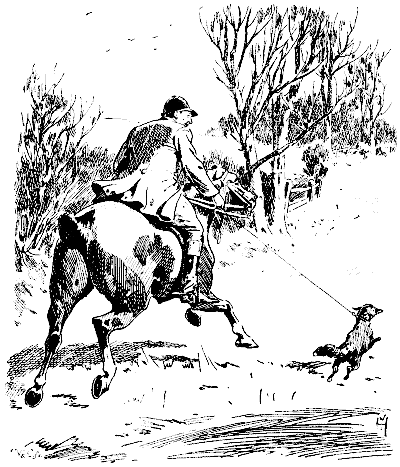
Simple Suggestion to Masters of Hounds (Fox or Harriers) for insuring the direction in which their Packs should run.
["If persons went out hunting, and, by means of their hounds, did damage to other people who were in proper use of the highway, they must take the consequences. There ought to be such command over hounds that they should not be allowed to rush over the highway."—Opinion of His Honour Judge L-w-s in Action brought by Mr. H-gh M-rr-s against Hon. C. H. W-nn.—"Yorkshire Post."]
(In one of the recent Intervals of Sunshine.)
O passer-by, I prithee hark to me!
You wonder, maybe, why my eyelids glisten
With clinging dewy teardrops, salt as sea.
I'll tell the story of my sadness. Listen!
The Arctic cold we've had so much of late
Made every fibre of my body quiver;
I struggled hard against relentless fate,
Then I decided I would no more shiver.
And that's just it. My grief now knows no bounds;
It crushes me; I don't know how to bear it.
I bought a new fur coat for fifteen pounds,
And now it's got so hot I cannot wear it!
QUEER QUERIES.—Damp and Depression.—I see that they have discovered a "Marsh Village" near Glastonbury. Would it be of any use to write to the Society of Antiquaries and tell them about our village, and ask them to come and inspect it? I don't think anything could well be much marshier. Even the ducks here suffer badly from rheumatism (which they don't try to suppress). We live all the year round on deep clay, and just at present on charity. The one thing that Soke-in-the-Mire never sees is dust. But it would gladly see the antiquaries, who would impart a much-needed stimulus to local trade, and could be well housed at the village inn, which is kept by my brother-in-law, so I know it to be a good one.